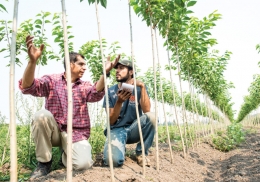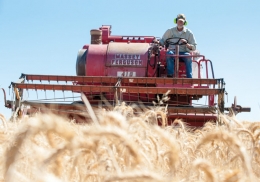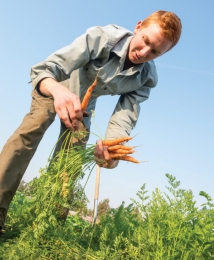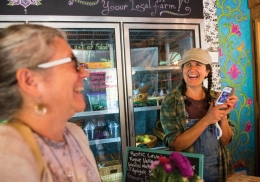The Big Future of Small Farms

Some might ask why we would include small farms in a special issue about the future of agriculture. Here’s why: small farms are part of Oregon’s agricultural mosaic. They are not a hold-over from a bygone era, they are an entry point for new farmers who seek the opportunity to grow food and fiber on family-run farms. The Small Farms and Community Food Systems Program at Oregon State, and the farmers it serves, provides a successful retort to the 1970s doctrine, “Get big, or get out.” The Small Farms Program at Oregon State brings together hundreds of these entrepreneurs in an annual conference to share the latest technologies for small- to medium-scale agricultural enterprises. Here are a few of their stories, from the 2017 Small Farms Conference.
Jose Ortega
[caption caption="Jose Ortega (left), who came to Oregon State to get a degree in agricultural education, met and interrned with his mentor, Javier Fernandez-Salvador, an OSU Small Farms specialist. (Photo by Lynn Ketchum.)"]  [/caption]
[/caption]
As a freshman in high school, Jose Ortega interned at a Los Angeles police station. The LAPD officers would ask him if he was going to be a cop. No, he’d reply. “I’m going to study plants.”
Ortega’s path toward plant science took some turns. After graduating from high school at the top of his class, he gave into family and peer pressure and chose computer science as his major in college. He didn’t thrive. Instead, he joined the Air Force. Stationed at a rural air base, Ortega would sometimes ride his motorcycle through the surrounding agricultural fields. There, he realized he felt happy. Eventually, he registered in community college, where he discovered the thrill of science. “It explains almost everything,” he says. “It is not a guessing game.”
Although a disability from the military hindered his ability to farm, Ortega decided to pursue a degree in agricultural education from OSU and find ways to reach a Spanish-speaking audience. “I found my bullseye,” he says.
During his first week at OSU, information about the Small Farms Conference popped up in his email. Ortega immediately noticed the Spanish-language track. “The doors opened,” he says. “It inspired me to get out of my comfort zone and meet people.”
One of those people was Javier Fernandez-Salvador, an Extension Small Farms specialist in Marion and Polk counties, who offered him a summer internship interviewing Spanish-speaking farmers about their programming needs. That led to another internship to study growing olive trees in Oregon.
Ortega also volunteers his time teaching science in Spanish to students at Jefferson Elementary School. He hopes to go on to graduate school. “I want to get involved in food systems and community building,” he says. “I want to learn so I can go back and help. There’s a need for me out there.”
Paul Harcombe
[caption caption="A former professor, Paul Harcombe turned to farming after retirement, a common occurrence in the world of small farming, which tends to draw young or retired people. (Photo by Lynn Ketchum.)"]  [/caption]
[/caption]
Farming had always appealed to Paul Harcombe. After retiring as a professor of ecology and evolutionary biology in Houston, Harcombe returned to Oregon determined to farm his 6-acre property, but without much experience or knowledge of farming. He learned about the Small Farms Program and the resources available to help first-time farmers. Eight years later, Harcombe successfully grows vegetable seeds for Fertile Valley Seeds in Corvallis.
The Small Farms Conference, in particular, helped him understand how farmers contribute to the local economy. In her presentation, Lauren Gwin, associate director of the Small Farms Program, talked about how every dollar spent on producing food contributes $1.25 to the economy. Harcombe came away realizing how important it is to educate people about the value of producing food.
“I walked out of that conference ready to go pound on the desk of my local commissioners and tell them they have to pay more attention to local small farmers.”
Farming is more challenging than Harcombe imagined, but rewarding, too. “I was a college professor and felt good about my contribution to society, but it was intangible,” he says. “Now I get much more positive feedback about my attempts as a farmer to make the world better.”
Emily Cooper
[caption caption="Emily Cooper, owner of Full Cellar Farm in Gresham, says the direct farmer-to-consumer connection is the best thing about small farming. (Photo by Lynn Ketchum.)"]  [/caption]
[/caption]
Emily Cooper’s greenhouse holds trays of newly planted vegetables, ready for the hectic farming season ahead. Inspiration came midwinter, when she attended the Small Farms Conference for the sixth time. She continues to find information there to help her succeed in a business that’s hard on the body and often on the bank account.
This year she was especially inspired by a talk by Ben Hartman, author of The Lean Farm, who says small-scale farming is a good career choice for young people. As one of those young people, Cooper agrees. Cooper started Full Cellar Farm in Gresham in 2014, growing pickling vegetables on an acre and a half. She’s now branched out with a CSA (community supported agriculture) and loves the farmer-to-consumer relationship. “I think the direct customer interaction is the hallmark of a small farm,” she says.
Much of the reason she became a farmer is the relationships she builds with the people who eat her food. “You can’t argue the rightness of producing food,” she says. “We all need food. There’s no moral gray area.”
She continues to learn from the Small Farms program. A workshop on farmscaping helped her to provide beneficial insects with what they need to fight off the not-so-beneficial ones. In another, she learned about a loan program for small-scale farmers.
After networking at the conference with people who share the same goals, Cooper felt ready to get back to farming. “We’re all excited to start the new season.”
James Berntson
[caption caption="James Berntson farms in Bend, a challenging climate for growing food. He perseveres, focused on serving the needs of local customers. (Photo by Lynn Ketchum.)"]  [/caption]
[/caption]
At a break during the Small Farms Conference, James Berntson milled around with hundreds of farmers, the energy and networking reinforcing his love for the career he’s chosen. It’s not easy. Farming in Bend—where summer frost can damage crops—is a challenge. But Berntson’s commitment drives him to get the knowledge he needs to succeed.
Conference workshops offered suggestions on farming efficiency. One time-saving tip was to replace hand-washing vegetables with a low-cost spin washer. More important was the reminder to not waste time growing food that customers don’t want.
From the get-go, Berntson has established relationships with farmers-market customers, chefs, grocery stores, and a distributor. These one-to-one relationships help focus his inventory. And they give him a role in the community, an important goal for this young farmer who strives to be a role model.
“My work is an example that you can produce your own food in this challenging climate and on a small scale,” he says. “A lot of people come to me for gardening advice, and a lot of that information comes from my interactions with OSU. I’m a resource and that’s gratifying.”
According to Garry Stephenson, director of OSU Extension’s Small Farms program, most young farmers move on to other careers, but Berntson has no plans to change. He has no desire to enlarge his micro farm, or drive a tractor, or supervise a large crew. He says he wants to keep a strong connection with his customers, to know where his food goes, and get to know who eats it.
Tina Arapolu
[caption caption="At her Easy Valley Farm stand, Tina Arapolu chats with a customer. Arapolu recently added cut flowers to her expanding inventory. (Photo by Lynn Ketchum.)"]  [/caption]
[/caption]
Busy hoeing weeds on her 2-acre Easy Valley Farm, Tina Arapolu barely glances up as a car stops at the farm stand on the busy road fronting the property. The driver gets out, selects some fresh vegetables, slips money into the cash box, and drives away.
Customers rarely leave the cash box empty, though some might occasionally leave an IOU. Often, one-time customers become regulars, bolstering Arapolu’s certainty that starting the farm seven years ago was the right thing to do. The Small Farms program has helped Arapolu and her partner, Coz Miklosovic, achieve their farming goals, with ongoing support from the League of Women Farmers, led by OSU assistant professor Maud Powell.
“I feel confident in the information I get,” Arapolu said. “They offer a lot of classes to get people started. Anytime you want to expand, there’s always something offered.”
The Easy Valley Farm is not always easy. Weeds, diseases, deer, and elk make farming life challenging in the Rogue Valley. Information from the Small Farms Conference convinced Arapolu and Miklosovic to focus on their farm-stand enterprise, which they’ve recently expanded with an inventory of flowers.
“I know we’re doing a good thing growing food and flowers,” Arapolo said. “Sometimes we wonder why we’re doing it and we think about stopping. Then we get a text from a customer who says, ‘I was just at your stand. I love you guys.’ That keeps us going.”


